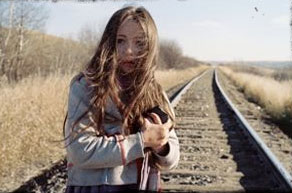Tideland

There is no doubt that Tideland is a Terry Gilliam film. All the elements are there: a tragic reality intertwined with a dark faerie tale, tangential flights of fancy, delightfully odd supporting characters which help or hinder or just confuse our heroine. And of course, the meticulous attention to costume and set design which all together add up to a familiar sense of Gilliam branded whimsey.
Jeliza-Rose is a child perhaps too perky and well groomed to be raised by burned out rocker parents. But then again, she is more parent than child, as she diligently prepares mom and dad’s heroin needle ‘vacations’ with some competence. She is also cautious of dangling cigarettes or awkward posture of dad as he enjoys his trip. She gets though the day by talking to her array of imaginary friends, a collection of doll heads each vying for her attention and the coveted spot of being perched on her finger tip. When dad decides to take her to visit her grandmother out on the picturesque Saskatchewan prairie, Jeliza-Rose wanders the wheat fields looking for adventure in her own imagination.
She stumbles across the eccentric neighbors. She befriends Dickens, a handicapped man who ‘swims’ through the wheat (in wetsuit and mask) in his submarine and hunts the shark which periodically rides by on the railway. She also has run-ins with Dickens shrewish sister, Dell, an eccentric taxidermist who dresses in a witch-like costume which is a cross between an Italian mourning shroud and a bee-keepers outfit. Jeliza-Rose’s growing feelings for Dickens and his treatment from his sister threaten a show down for his attention between self-reliant little girl and tyrant Dell.
So what went wrong with Tideland? Well, it feels as though it should have been a short film, but got blown up to feature length. Gilliam films tend to find their strengths in his rough-around-the-edges and everthing-but-the-kitchen-sink narrative style. But oh does it hurt this picture, where too many scenes feel redundant or unnecessarily long. The doll-headed characters are never fully realized, and the references to Alice in Wonderland and the Wizard of Oz feel more tacked on then fully enmeshed into the story.
The wide prairies are perhaps the wrong venue for Gilliam, as his oddball costumes and characters feel curiously dwarfed by the wide open sky and endless sea of wheat. His style worked better in the closterphobic environs of Brazil, Fear and Loathing in Las Vegas or Twelve Monkeys but here it unfortunately looks like well-shot high-school drama theatre.
Tideland also rests completely on Jodelle Ferland’s shoulders. She is in every scene and she even does the voices for all of her doll heads. It is a pity that she is not quite the actress to carry the whole film. Her performance is adequate, but not compelling enough to add any weight. Scenes go on for too long, with many sequences feeling redundant. Jeff Bridges and Jennifer Tilly exist only in glorified cameos. Tilly, nearly unrecognizable as a bloated and disgusting chocoholic junkie, has so little screen time, if you blink you’ll miss her.
The final revelation treads the same territory as the marriage of grim reality with fantasy so well achieved in the final scene in Time Bandits. In fact one could look at Tideland as a (far too extended) riff on that final scene, and sadly, litte else. There are some elements that work, but you could squeeze these into perhaps 25-30 minutes at most.

0 Comments:
Post a Comment
<< Home